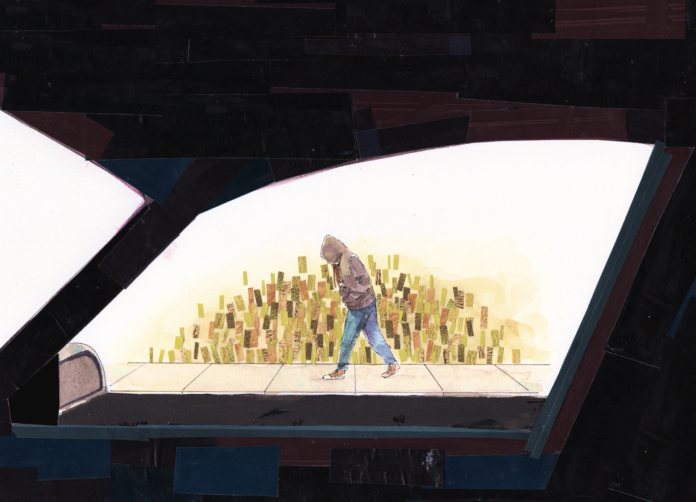
A conversation about lost voices with author Jacqueline Doyle.
In her flash fiction collection, The Missing Girl, Jacqueline Doyle spotlights stories usually relegated to the back pages of newspapers. Her eight disturbing and vivid tales reveal the vulnerability of women to violence in our society. With names like Nola, Cathy, Eula, and Kelly, they are our neighbors, sisters, daughters. Their terrors are our terrors. In Doyle’s skillful hands, that familiarity makes it impossible to look away, impossible to say, “It can’t happen to me.”
One would never suspect such darkness from the tall, slim brunette with the generous smile and luminous hazel eyes who met me for dinner last fall at the Sparrow Bar and Kitchen on Haight Street. A longtime fan of Doyle’s work, I was excited to talk shop, writer to writer. But the first thing I had to know was what brought this born-and-raised New Jersey girl to the Golden State.
“I fell in love with a Californian,” she said. “I was doing my Ph.D. in literature at Cornell in 1982 when I met my now-husband, Steve, who was doing his MFA in creative writing.” “Steve” would be the writer Stephen D. Gutierrez. In 1994, both were offered tenured professorships in the English department at California State University, Hayward, now known as Cal State East Bay.
A frequent presence on the Bay Area literary scene, the two writers often collaborate on stories under the pen name Alvarado O’Brien, a combination of their Mexican and Irish heritage. “We both write in several genres,” Doyle said. “I consider myself primarily a creative nonfiction writer, while Steve considers himself primarily a fiction writer. There’s a space for hybrid collaboration there, as different as our writing styles are.”
It was reading a lyric essay by two poets that gave Doyle the idea to work together. She wrote her own lyric paragraph and passed it on to Steve, asking him to riff on her language and imagery. “He immediately transformed it into a story with characters,” she said. “Then I went back to develop characters in my opening section, and we alternated back and forth like that, finding our rhythm, occasionally adding to or revising each other’s sections. Steve says collaboration is like Frankenstein, only instead of one genius you have two doctors working different shifts, and you hope the monster turns out alive.”
Prior to the COVID-19 restrictions on gatherings, Doyle was a frequent guest reader at local venues including Octopus Salon in Oakland, Pegasus Books in Berkeley, and the City’s Green Apple Books and The Bindery.
“I’d been teaching at Cal State University in Hayward for years before I finally ventured over the Bay Bridge to participate in literary events,” she said. “At the time, there was the Literary Death Match, a raucous reading series that drew enormous crowds. Readers who surpassed their time limit were drenched with Nerf Super Soakers while the audience cheered. In contrast was the much more intimate Rolling Writers series curated by Jon Sindell and held at the tiny Rolling-Out Café in Parkside. After all those years in academia, where the literary events are often stuffy affairs, the vibrant and various literary scene in San Francisco was a breath of fresh air.”
The Missing Girl was published by Black Lawrence Press in 2018 after winning the press’s annual chapbook contest. The slim, powerful collection is a mix of new and previously published work.
“I had no intention of putting together a collection about girls and women who’d been silenced, exploited, or gone missing, and their predators. In fact, it was several years before I realized those were recurrent themes in my work,” Doyle said.
. . .
Excerpt from The Missing Girl by Jacqueline Doyle
You can see her in your mind’s eye, perky smile dimming, fear dawning in her eyes. Yes, you feel like you know this girl. Just the kind to go missing. Awkward and shy. Inexperienced and eager. Tender, playing brave. Dirt poor. You know. The kind of girl who’ll step right into your car if you call her pretty.
Jerrold Road is empty today. Birds gather in one of the tall, bare trees by the roadside, jabbering. Dead leaves whirl in the wake of a chilly gust of wind. Yellow grass. Gray sky. Not a car in sight. Just a girl in a gray sweatshirt, hood up against the cold, walking.
Slow way down and hit the button for the passenger window.
Go ahead, say it. “Hey pretty girl, want a lift?”
. . .
When tempted to apologize for the darkness of the stories in The Missing Girl, Doyle recalled a quote from Joyce Carol Oates. Asked why her writing was so violent, Oates replied that the question is “always insulting, always sexist. These things do not need to be contrived. This is America.”
In addition to Oates, Doyle has several “foremothers”—her strongest literary influences. She mentions Jayne Anne Phillips’s flash in her collection Black Tickets, in which one story is narrated by a serial killer who preys on young women; Sandra Cisneros’s flash vignettes about women and girls trapped by their circumstances; and Toni Morrison, who from The Bluest Eye onward never allowed others to determine what subjects were off-limits.
“My feminism drew me to those writers, but they are the writers who shaped my feminism. I don’t think I would have written The Missing Girl without them,” Doyle said. “I consider pulling back the curtain on violence against women a strong feminist statement.”
Doyle easily slips between genres. “I started as a creative nonfiction writer, moving from personal essays to narrative nonfiction, and for a long time that was my primary form. It is still my first love, but flash fiction is a close second,” she said. “I love the compression and resonance of very short writing. Flash has no rules at all beyond word count and the necessity that the work be complete in itself. I love the freedom that allows me.”
Doyle’s work has earned her numerous honors including 13 Pushcart Prize nominations, two finalist listings in The Best Small Fictions, and six notable essay citations in Best American Essays. Her latest project is a collection of memoir essays titled The Lunatics’ Ball.
From the title story:
“We’re the two crazy ladies in the family,” Maddy said to me once. We were drinking red wine at an Italian restaurant, laughing about something. I was in my late twenties then, working on my Ph.D. It was before I got sober, before my own hospitalization and bipolar diagnosis. Only my closest friends, my parents, and my brother knew about my week in the mental ward. By then, Maddy was already gone.”
“The character of Maddy is based on my aunt, who had a history of mental illness and committed suicide, so coming out as bipolar was a major step for me,” Doyle said. “In The Lunatics’ Ball, I blend memoir and research, and profiles of ‘lunatics,’ some well-known, like Zelda Fitzgerald, some obscure, many of them thwarted artists. And again, I deal with the questions about who gets to speak and whose voices are lost.”
The recurrence of themes in The Lunatics’ Ball and The Missing Girl is not lost on Doyle. “I have an epigraph from Sherwood Anderson in The Missing Girl that could serve for both projects. An artist talks about a ‘dark spot’ in his painting that ‘you might not notice at all,’ ‘something hidden’ that is ‘the beginning of everything’: a hidden woman. Somehow, mysteriously, I feel that’s true of my work too.”
The past year has brought seemingly endless trials: the pandemic, a bitterly divided election, racial unrest, and continued injustice and violence. With Doyle’s work already leaning to the dark side, I wondered how her writing had been affected.
“For months, I’ve been feeling a lack of focus, an inability to concentrate on writing or even on sustained reading. I’m used to being far more productive and I miss that, it’s good for my soul. I haven’t stopped writing altogether though. Recently, I published a microfiction online in Dream Journal called ‘End Times,’ about the effects of the election and the current climate of violence on me. And not just the election but the potential aftermath has had me tied up in knots.”
Doyle retired from her position as an English professor at Cal State East Bay in June of last year after a teaching career that spanned over 30 years, beginning at Cal State Fresno in 1986.
Not one to rest on her laurels, Doyle has taken on a new position as creative nonfiction editor at CRAFT literary journal, while continuing her own powerful writing. ♦
Jayne Martin is a native San Franciscan whose family roots in the City can be traced back to the early 1900s. The booking manager for Hyde Street Studios back when it was Wally Heider Studios, she recalls the Grateful Dead always having the best hash. After a couple of decades writing movies for television, she turned her writing chops to flash and microfiction: Tender Cuts, a collection of 38 stories all under 300 words, is available from Vine Leaves Press.
Tess Powell is an artist in San Jose who recently studied in San Francisco and misses it very much. She enjoys her monthly trip to the grocery store during these pandemic times, but she tries not to let her sanity hinge on it.


